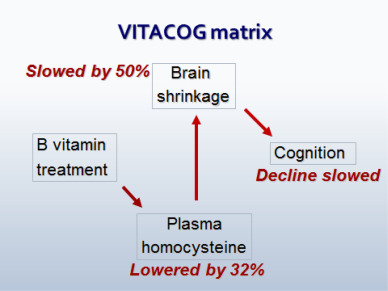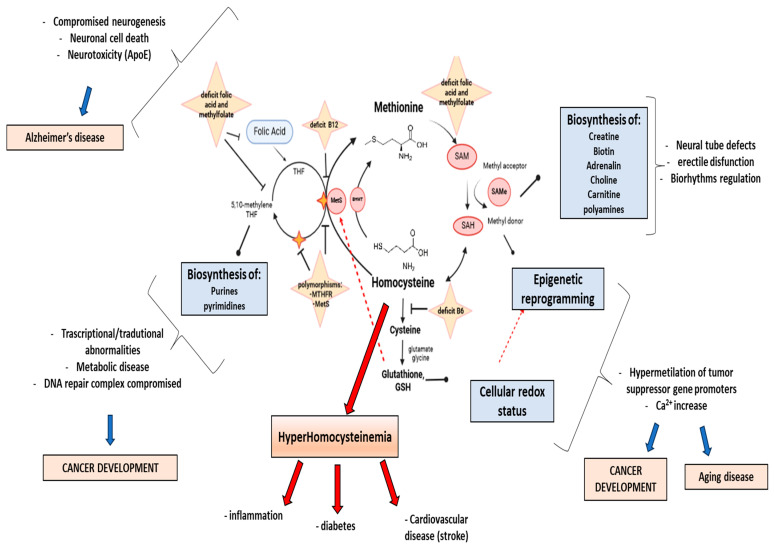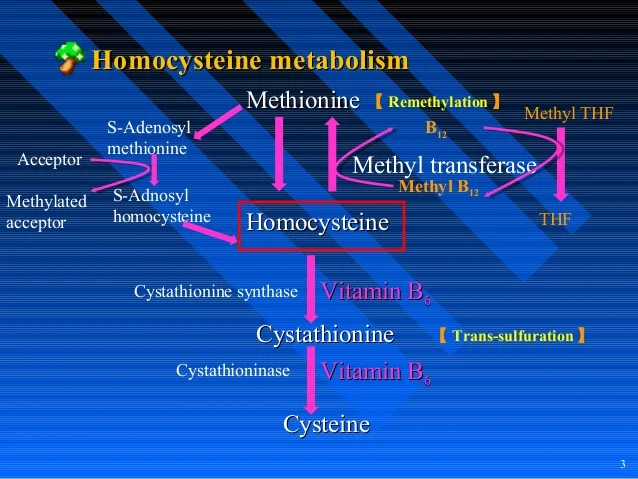Does brain shrinkage lead to dementia?
-
Brain shrinkage/atrophy is often thought of as a natural consequence of aging. The medical/pharmaceutical system likes to assign disease names to different patterns of brain shrinkage and then focus on drugs to treat the symptoms that manifest after the brain shrinkage become pathologic.
There are diet and lifestyle choices that accelerate aging and others that slow brain shrinkage. I am wondering if slowing brain shrinkage will delay the onset of dementia. The idea is to reduce the rate of brain shrinkage so that dementia is postponed. It seems like the medical/pharmaceutical is ignoring the idea decelerating the rate of brain shrinkage. It would not be in their shareholders interest.
One strategy for slowing loss of brain structure is to reduce your homocysteine by getting adequate levels of B vitamin in your diet.
Critical levels of brain atrophy associated with homocysteine and cognitive decline (2014)
Abstract
Few B-vitamin trials to lower homocysteine (Hcy) have reported evidence of beneficial effects on cognition in older adults with cognitive impairment or Alzheimer's disease. This article reviews the role of Hcy in cognitive decline. It also considers some reasons why meta-analyses have failed to find effects of B-vitamin treatment. Findings from the successful VITACOG trial are examined from a new perspective of critical levels of Hcy and brain atrophy that may impact on the efficacy of B-vitamin treatment. It appears that there is a critical level of brain shrinkage, possibly mediated by elevated Hcy, which when reached, results in cognitive decline, especially in episodic memory performance. Supplements, food sources, and effects of folic acid fortification are discussed in relation to B12 deficiency.

-
@DavidPS said in Does brain shrinkage lead to dementia?:
One strategy for slowing loss of brain structure is to reduce your homocysteine
What I dont understand is how. methionine restriction can be so healthy (also for the brain). when it causes hyperhomocysteinemia....
-
@Mauritio - Homocysteine (Hcy) is an amino acid and it is strongly correlated with dementia (both Parkinson’s disease (PD) and Alzheimer’s disease (AD) ) and vascular disease including stroke. The metabolism of Hcy is linked to that of several vitamins—especially folate, B6, and B12. Concentrations of homocysteine can be inexpensively and safely lowered by treatment with a combination of these B vitamins.
Homocysteine and Parkinson's disease (2023)
Association analyses of nutritional markers with Parkinson’s disease and Alzheimer’s disease (2024)
Homocysteine and Alzheimer's disease (2003)
Homocysteine as a predictor of cognitive decline in Alzheimer’s disease (2010)
Homocysteine, vitamins, and vascular disease prevention (2007)
-
@DavidPS I know. But that doesn't really answer the issue I brought up...
-
@Mauritio said in Does brain shrinkage lead to dementia?:
But that doesn't really answer the issue I brought up...
We need tryptophan to form B3 when lacking.
Once again, it's a question of proportions. Why?
Note: Tryptophan has limited access to the brain, sometimes leading to migraines. See details below.No need to use B3 for lowering Homocysteine if we bring enough B6. But B6 is exhausted if we suffer from low inflammation grade (like arthrosis). See the brol! (local expression inducing havoc).
Note: Homocysteine levels go up as methyl donors get used up. Idem when following HD B3.
=> 500 mg TMG 2x/d when required.Additional info:
Tryptophan
Tryptophan has limited access to the brain, thus sometimes the cause leading to migraines.
Tryptophan must share the transport to brain with five other amino acids: tyrosine, phenylalanine, valine, leucine and isoleucine. So, for example, an excess or deficiency of tyrosine will inhibit the passage of tryptophan.See too:
https://raypeat.com/articles/articles/gelatin.shtml
Both tryptophan and cysteine inhibit thyroid function and mitochondrial energy production, and have other effects that decrease the ability to withstand stress. Tryptophan is the precursor to serotonin, which causes inflammation, immunodepression, and generally the same changes seen in aging. Histidine is another amino acid precursor to a mediator of inflammation, histamine; would the restriction of histidine in the diet have a longevity promoting effect, too? -
@LucH said in Does brain shrinkage lead to dementia?:
@Mauritio said in Does brain shrinkage lead to dementia?:
But that doesn't really answer the issue I brought up...
We need tryptophan to form B3 when lacking.
Once again, it's a question of proportions. Why?
Note: Tryptophan has limited access to the brain, sometimes leading to migraines. See details below.No need to use B3 for lowering Homocysteine if we bring enough B6. But B6 is exhausted if we suffer from low inflammation grade (like arthrosis). See the brol! (local expression inducing havoc).
Note: Homocysteine levels go up as methyl donors get used up. Idem when following HD B3.
=> 500 mg TMG 2x/d when required.Additional info:
Tryptophan
Tryptophan has limited access to the brain, thus sometimes the cause leading to migraines.
Tryptophan must share the transport to brain with five other amino acids: tyrosine, phenylalanine, valine, leucine and isoleucine. So, for example, an excess or deficiency of tyrosine will inhibit the passage of tryptophan.See too:
https://raypeat.com/articles/articles/gelatin.shtml
Both tryptophan and cysteine inhibit thyroid function and mitochondrial energy production, and have other effects that decrease the ability to withstand stress. Tryptophan is the precursor to serotonin, which causes inflammation, immunodepression, and generally the same changes seen in aging. Histidine is another amino acid precursor to a mediator of inflammation, histamine; would the restriction of histidine in the diet have a longevity promoting effect, too?That answers my question even less lol ... I give up .
-
@LucH - Thanks for your reply. I am here to learn as well as help. It seems that you are always connecting dots that I failed to consider.
-
@Mauritio This is a https://dictionary.cambridge.org/dictionary/english/connect-the-dotsing area. Perhaps this will help.
Hyperhomocysteinemia and Disease—Is 10 μmol/L a Suitable New Threshold Limit? (2024)

-
@DavidPS
Thanks for comment.Here is some more information to help connecting the dots ...
Serotonin and Mood
Is serotonin a booster or a downer?
Serotonin is a central nervous system (CNS) neurotransmitter secreted by a group of neurons called serotonergic neurons. Serotonin is one of the monoamines which are particularly involved in the regulation of states of alertness and mood. We often see that people with unstable moods, depression, are deficient in hormonal secretion, with an impact on emotions, appetite, sleep, temporary aggressiveness, etc.
Serotonin fulfills many other metabolic functions, such as thermoregulation (cold extremities), pain control (anti-inflammatory), eating behavior (satiety), sexual desire, memory, etc. (1)
What effect can serotonin have on humans?
In addition to these biological functions, the effects of serotonin on our mind should not be taken lightly (regulation of emotions), in more sensitive or more fragile people. (…)
Is serotonin a booster or a downer?
“By increasing extracellular serotonin, SSRIs disrupt energy homeostasis and often worsen symptoms during acute treatment. The science behind many anti-depressant medications appears to be backwards.” (3) (…)
Useful nutrients
To rebalance serotonergic function, it is necessary to combine:- Vitamin B6 which participates in the synthesis of serotonin;
- Vitamin B3 (niacinamide, not niacin) which promotes the cerebral metabolism of tryptophan at the expense of its hepatic metabolism (i.e. produced via the liver);
- Magnesium to reduce stress, and which also has an anti-water retention effect;
NB1: A dose of Mg and B6 will therefore be welcome with the sweet snack at 5 p.m.
Parenthesis: We often recommend eating a banana, a square of chocolate or a few pieces of coconut, or even oilseeds, as a 4-5 p.m. snack because these foods are naturally rich in tryptophan, the precursor of serotonin. OK, but let's try to understand the process.
…
To be continued on this link (In French, with links in English; translator needed).
https://mirzoune-ciboulette.forumactif.org/t1829-la-serotonine-comme-booster-ou-downer#25014
-
There is more than one way to shrink a brain:
. -
